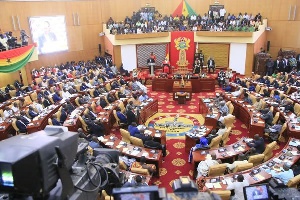The three Teacher Unions in the Western and Western-North Regions in conjunction with the Teachers and Educational Workers Union (TEW) have called on the national leadership of Parliament to suspend the Pre-Tertiary Education Bills (2019) currently at the committee level in Parliament.
According to the Unions, there must be deeper stakeholder consultation before Parliament could go-ahead to pass the bill into law.
The Unions contended that certain portions of the bills were inimical to policies in education which have the tendency to collapse the structures of the Ghana Education Service (GES).
The Western Regional Chairman of the Ghana National Association of Teachers (GNAT), Rev. Charles A. Kaku who was flanked by the Regional Chairman of the National Association of Graduate Teachers (NAGRAT), Justin Nelson, the Regional Secretary of GNAT, Mr. Nicholas Taylor, the Regional Vice-Chairman of the Coalition of Concerned Teachers-Ghana, and Mr. Emmanuel Kusi, the Regional Industrial Relations Officer of the Teachers and Educational Workers Union (TEWU), told a news conference in Takoradi.
The Regional Chairman of GNAT reminded the Ministry of Education (MOE) and Parliament to take note of the concerns of the teacher unions before they proceed with the consideration of the bills.
Rev. Kaku said the teacher unions consider education a key to national development hence any attempt to introduce policies and legislation in the sector must engage teachers as major stakeholders.
Chanting "twoboi" to register their displeasure with the bills, the GNAT Chairman said the bill as it currently stands seeks to cede the effective responsibility for the provision and management of basic schools to the District Assemblies.
It also seeks to cede the management of the Senior High Schools to the Regional Education Directorate (Regional Coordinating Council) with Technical and Vocational Education Training (TVET) to be managed by their own Director-General independent of the Ghana Education Service.
Rev. Kaku wondered whether there was going to be situations where each District Assembly was going to pay their own teachers and the capacity of various District Assemblies to shoulder this responsibility.
He warned that if the bill is allowed to go through in its current state, it has the tendency to break the unified educational arrangement.
He added that if the bill is allowed to go through in its current state, it has the tendency to break the unified educational arrangement we have now and also has the potential of distorting the unified condition of service as the various MMDCEs will develop their independent condition of service which may not be in the best interest of their members.
Under section 31 of the bill, the Head of Local Government Service would be appointing Heads and Staff of the District Education unit as well as be responsible for promotion, transfer, discipline and dismissal of the staff of the District Education Unit.
He said the position of the Unions is that the country is already politically polarized and again any party that comes to power would like to have their party sympathizers occupy positions even when they are not the most qualified people which opens the floodgate to perpetual politicization of appointment of heads of schools.
Rev. Kaku cited section 32 (3 of the bill which stipulates that the District Officer in charge of the Education unit can only grant transfer to a headteacher or a staff of a basic school within the same District.
The Unions, therefore, demanded an answer from government whether teachers are now going to be restricted to a District and can no longer get transferred to other Districts and Regions.
The bill also states that inter-District transfer of a Headteacher or a staff of a basic school can only be undertaken by the Head of the Local Government Services under section 32 (4) of the bill.
Under the bill, the President of the Republic shall be appointing Regional Directors and their Deputies and determine their terms and conditions of service under section 25 (2) and section 26 (2) of the bill.
The preparation, administration and control of budgetary allocations of the basic schools shall be determined by the District Assemblies under section 30 (1c) of the bill.
The bill also states under section 36 (1) that teachers employed in basic schools are on the coming into force of this act, transferred to the Local Government Service.
The teachers are therefore asking whether basic school teachers are going to be civil servants or public servants and the fate of Senior High School teachers whether they will be placed in the Regional Coordinating Councils.
From the foregoing, the teacher unions are of the view that the bill will be dangerous to the teaching profession with the tendency of destroying the very fabric of the management arrangement of Ghana Education Service in the country.
At the solidarity conference, the teachers were resolved to resist the passage of the bill with all our legitimate might and strength as teachers to preserve the unified teaching profession at the pre-tertiary level.
"We have cautioned and still cautioning that should our concerns and inputs be disregarded or ignored, we the pre-tertiary education teacher unions would advise ourselves accordingly", they warned.
Regional News of Thursday, 5 March 2020
Source: Daniel Kaku, Contributor













